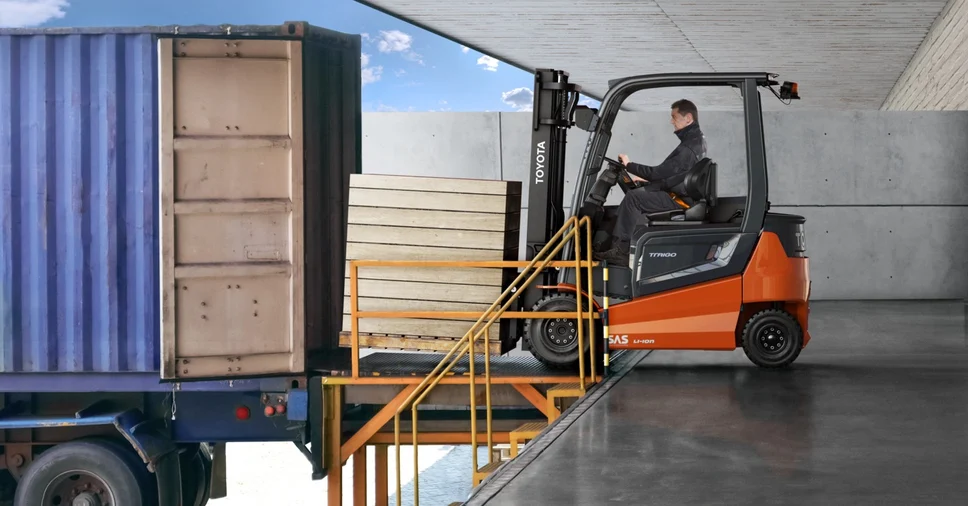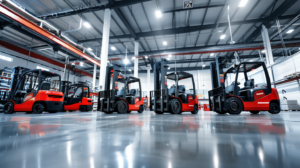Forklifts are essential pieces of equipment in warehouses, manufacturing plants, construction sites, and any industry that handles heavy loads. Whether you run a small business or a large-scale operation, having access to a forklift can streamline tasks, reduce manual labor, and improve operational efficiency. But when it comes to acquiring a forklift, a critical decision must be made: should you buy or rent one?
This article explores the pros and cons of both buying and renting a forklift, helping you make an informed decision based on your business’s needs, financial situation, and long-term plans. By the end, you’ll have a clearer understanding of which option is best for your circumstances.

1. Introduction: Understanding Forklift Needs
Forklifts come in various types, sizes, and functionalities, making them indispensable for lifting and transporting heavy goods in industries like logistics, manufacturing, and retail. However, determining whether to buy or rent a forklift depends on several factors including cost, usage frequency, maintenance requirements, and long-term business goals.
Some companies may need a forklift for occasional use, while others rely on them daily. The frequency and duration of forklift usage significantly influence the decision to buy or rent. Let’s break down the details to see what’s more advantageous.
2. Buying a Forklift: Key Considerations
Buying a forklift is an investment that can offer long-term benefits, especially if your business consistently relies on this equipment. Here are some critical factors to consider when purchasing a forklift.
2.1. Long-Term Cost Efficiency
One of the main reasons businesses opt to purchase forklifts is the long-term cost savings. If your company uses forklifts frequently, buying can be more economical over time compared to continuous rental fees. Although the upfront cost is high, owning a forklift means you avoid ongoing rental payments, which can add up quickly.
2.2. Full Control Over Equipment
When you own a forklift, you have complete control over its use and management. You can customize it, maintain it according to your preferences, and use it whenever necessary without coordinating with a rental company. This flexibility is essential for businesses with unpredictable schedules or high daily usage.
2.3. Depreciation and Asset Value
Purchasing a forklift also means that you can add it as an asset to your company’s balance sheet. Although it will depreciate over time, owning equipment may offer some resale value down the line, providing a small return on your investment when it’s time to upgrade.
2.4. Maintenance Responsibility
However, one of the significant downsides of owning a forklift is that maintenance and repair costs fall on the business. Regular maintenance is necessary to keep the forklift in optimal condition, and any significant repairs could be costly. These factors need to be budgeted for, as failing to maintain the equipment can lead to operational downtime.
2.5. Tax Incentives
In some regions, there are tax advantages to owning equipment. Depreciation can often be written off on taxes, and some government incentives may allow deductions for capital equipment purchases. This can make buying a forklift more attractive from a financial perspective, depending on local tax laws.

3. Renting a Forklift: Key Considerations
On the other hand, renting a forklift can offer significant advantages, particularly for businesses with temporary or fluctuating needs. Here are some of the primary reasons why companies choose to rent instead of buying.
3.1. Lower Initial Costs
Renting a forklift is ideal for companies that need equipment on a short-term basis or cannot afford the large upfront expense of purchasing. Renting allows businesses to access high-quality machinery without a significant initial outlay. This makes renting a more affordable option, especially for start-ups or companies with limited capital.
3.2. Flexibility and Scalability
Another advantage of renting is the flexibility it offers. If your needs change, you can easily scale up or down by renting additional forklifts or returning them as needed. This is especially useful in industries with seasonal demands or fluctuating workloads.
For example, a warehouse may experience increased demand during the holiday season and need extra forklifts temporarily. Renting allows them to meet this increased demand without the long-term commitment or financial strain of purchasing additional equipment.
3.3. Access to the Latest Models
When you rent a forklift, you often have access to the latest models with the most up-to-date technology and features. Rental companies frequently upgrade their fleet, meaning you can benefit from modern machinery without the need for large investments. This ensures your operation is efficient and using the best equipment available, which may not be possible if you buy a forklift and keep it for many years.
3.4. No Maintenance Costs
One of the biggest perks of renting is that maintenance and repairs are usually included in the rental contract. This means that if the forklift breaks down or requires servicing, the rental company will handle it, saving you from unexpected costs and downtime. For companies that want to avoid the hassle and expense of maintaining equipment, this is a major selling point.
3.5. Testing Before Commitment
If you’re uncertain about what type of forklift you need or if your long-term needs are unclear, renting allows you to test different models and sizes before committing to a purchase. This is particularly useful for new businesses that are still assessing their operational needs.

4. When to Buy a Forklift
Buying a forklift is a wise decision in specific scenarios. Here are some indicators that your business may benefit from owning rather than renting.
4.1. High Daily Use
If your company uses a forklift for multiple hours every day or most days of the week, purchasing may make more financial sense. High usage justifies the investment, as rental fees would quickly surpass the cost of ownership.
4.2. Stable, Long-Term Operations
Businesses with consistent workloads and established long-term operations should consider buying forklifts. This is especially true for industries like manufacturing or large-scale warehousing, where forklifts are essential to daily operations.
4.3. Customization Needs
If you require specialized attachments or modifications on your forklifts, owning the equipment allows you to customize it to your specific requirements. Rental companies may not offer this level of customization or may charge extra for it.
4.4. Tax Benefits
Companies looking to take advantage of tax benefits related to depreciation and capital expenditures should consider buying their forklifts. However, it’s essential to consult with a financial advisor to ensure this aligns with your company’s tax strategy.

5. When to Rent a Forklift
Renting a forklift is an excellent option for businesses with more sporadic or temporary needs. Here are some situations where renting is the better choice.
5.1. Short-Term or Occasional Use
For businesses that only need a forklift for a short-term project or occasionally throughout the year, renting is more cost-effective. Paying the purchase price for equipment that sits idle for most of the year doesn’t make financial sense.
5.2. Budget Constraints
Small businesses or start-ups with limited capital may find renting more feasible. Renting allows them to avoid a large upfront investment and provides access to equipment while keeping operational costs predictable and manageable.
5.3. Temporary Increase in Demand
Seasonal businesses or companies experiencing temporary surges in demand (such as during peak seasons) often choose to rent forklifts. This allows them to meet increased operational needs without committing to a long-term purchase.
5.4. Need for Latest Technology
If your business values having access to the newest models and technology, renting might be the best option. You can regularly upgrade to the latest forklift models through your rental provider, ensuring your equipment is always up-to-date without the depreciation that comes with ownership.

6. Financial Comparison: Buy vs Rent
To make an informed decision, it’s essential to compare the costs of buying versus renting over time.
| Factor | Buying | Renting |
|---|---|---|
| Upfront Cost | High | Low |
| Long-Term Costs | Lower if used frequently | Higher if used long-term |
| Maintenance | Business responsibility | Covered by rental company |
| Flexibility | Low (you’re committed to that machine) | High (can return or upgrade easily) |
| Depreciation | Yes, forklift loses value over time | No depreciation costs |
| Access to New Technology | Requires new purchases | Can rent the latest models |
| Tax Benefits | Possible depreciation deductions | No ownership, so no depreciation benefits |
7. Making the Right Decision for Your Business
Choosing whether to buy or rent a forklift depends largely on your business model, financial capabilities, and operational requirements. Here are a few guiding questions to help you decide:
- How often will the forklift be used? If it’s a daily necessity, buying might be more cost-effective.
- What’s your budget? If you have limited capital, renting may be the best option.
- How flexible are your needs? If your business experiences peaks and valleys in forklift demand, renting allows you to scale your equipment accordingly.
- Do you prefer newer models and technology? Renting gives you access to the latest forklifts without committing to an aging machine.
- What are your long-term plans? For stable businesses with a predictable demand for forklifts, buying can provide greater long-term value.

8. Conclusion: Buy or Rent a Forklift?
Ultimately, the decision to buy or rent a forklift depends on your specific business needs, financial situation, and future plans. Both options have distinct advantages and disadvantages, and understanding your company’s usage patterns, budget constraints, and long-term objectives will help you make the right choice.
For businesses looking for a reliable and high-quality forklift, we highly recommend the Nicosail brand. Nicosail forklifts are known for their durability, advanced features, and cost-effectiveness, making them a top choice for both rentals and purchases. Whether you’re looking to rent or buy, Nicosail offers a range of models that suit various industrial needs, ensuring your operations run smoothly and efficiently.





